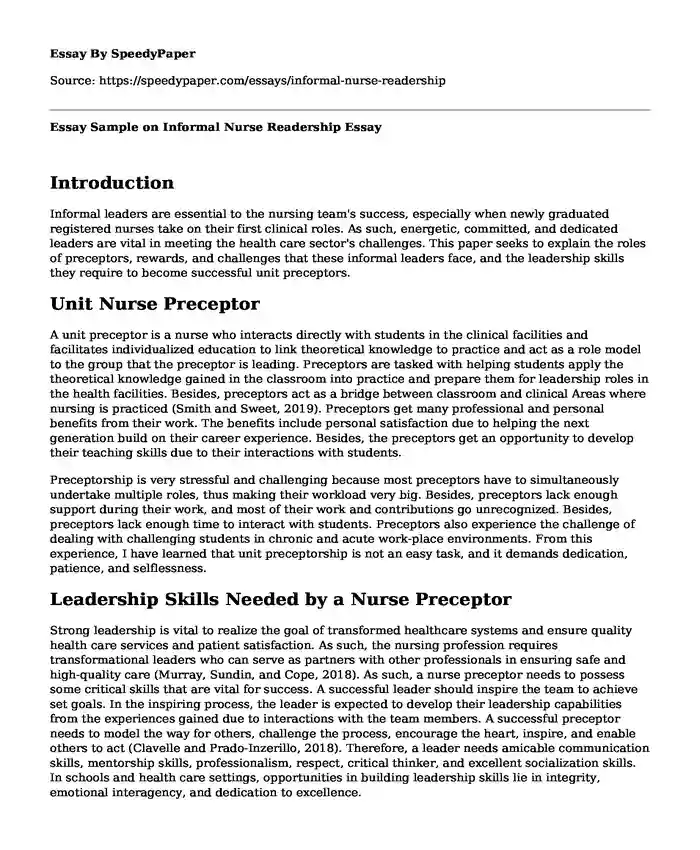
| Type of paper: | Essay |
| Categories: | Nursing |
| Pages: | 3 |
| Wordcount: | 770 words |
Introduction
Informal leaders are essential to the nursing team's success, especially when newly graduated registered nurses take on their first clinical roles. As such, energetic, committed, and dedicated leaders are vital in meeting the health care sector's challenges. This paper seeks to explain the roles of preceptors, rewards, and challenges that these informal leaders face, and the leadership skills they require to become successful unit preceptors.
Unit Nurse Preceptor
A unit preceptor is a nurse who interacts directly with students in the clinical facilities and facilitates individualized education to link theoretical knowledge to practice and act as a role model to the group that the preceptor is leading. Preceptors are tasked with helping students apply the theoretical knowledge gained in the classroom into practice and prepare them for leadership roles in the health facilities. Besides, preceptors act as a bridge between classroom and clinical Areas where nursing is practiced (Smith and Sweet, 2019). Preceptors get many professional and personal benefits from their work. The benefits include personal satisfaction due to helping the next generation build on their career experience. Besides, the preceptors get an opportunity to develop their teaching skills due to their interactions with students.
Preceptorship is very stressful and challenging because most preceptors have to simultaneously undertake multiple roles, thus making their workload very big. Besides, preceptors lack enough support during their work, and most of their work and contributions go unrecognized. Besides, preceptors lack enough time to interact with students. Preceptors also experience the challenge of dealing with challenging students in chronic and acute work-place environments. From this experience, I have learned that unit preceptorship is not an easy task, and it demands dedication, patience, and selflessness.
Leadership Skills Needed by a Nurse Preceptor
Strong leadership is vital to realize the goal of transformed healthcare systems and ensure quality health care services and patient satisfaction. As such, the nursing profession requires transformational leaders who can serve as partners with other professionals in ensuring safe and high-quality care (Murray, Sundin, and Cope, 2018). As such, a nurse preceptor needs to possess some critical skills that are vital for success. A successful leader should inspire the team to achieve set goals. In the inspiring process, the leader is expected to develop their leadership capabilities from the experiences gained due to interactions with the team members. A successful preceptor needs to model the way for others, challenge the process, encourage the heart, inspire, and enable others to act (Clavelle and Prado-Inzerillo, 2018). Therefore, a leader needs amicable communication skills, mentorship skills, professionalism, respect, critical thinker, and excellent socialization skills. In schools and health care settings, opportunities in building leadership skills lie in integrity, emotional interagency, and dedication to excellence.
Self-Reflection
As a leader, my strengths include good communication skills, which have dramatically helped me facilitate collaboration. Also, I am useful in planning and decision making, which a vital trait for leaders to solve problems. I am a good role model, and I take charge of situations that require my input. More so, I like supporting and encouraging others to achieve the set goals. My leadership style is democratic in a group setting, although I am working very hard to develop into a transformational leader. A transformational leader is the one who motivates the followers to be appealing to higher ideals and moral values (Masood and Afsar, 2017). As such, I wasn't that leader who makes it safe for staff to be creative and innovative. Doody and Catriona (2012) explained that transformational leadership is the most effective because it recognizes the importance of reward and engages the followers' intellectual and emotional aspects. As a leader, I would like to strengthen my intellectual stimulation, idealized influence, and individualized considerations. To strengthen my leadership skills, I plan to learn to follow and appreciate other leaders, take more projects and responsibilities, and keep learning from other professionals through seminars, workshops, and furthering my education.
References
Clavelle, J. T., & Prado-Inzerillo, M. (2018). Inspire others through transformational leadership. American Nurse Today, 13(11), 39-41.
Doody, O., & Doody, C. M. (2012). Transformational leadership in nursing practice. British journal of nursing, 21(20), 1212-1218.
Masood, M., & Afsar, B. (2017). Transformational leadership and innovative work behavior among nursing staff. Nursing Inquiry, 24(4), e12188. https://doi.org/10.1111/nin.12188
Murray, M., Sundin, D., & Cope, V. (2018). The nexus of nursing leadership and a culture of safer patient care. Journal of clinical nursing, 27(5-6), 1287-1293. https://doi.org/10.1111/jocn.13980
Smith, J. H., & Sweet, L. (2019). Becoming a nurse preceptor, the challenges and rewards of novice registered nurses in high acuity hospital environments. Nurse education in practice, 36, 101-107. https://doi.org/10.1191/1478088706qp063oa
Cite this page
Essay Sample on Informal Nurse Readership. (2023, Dec 13). Retrieved from https://speedypaper.com/essays/informal-nurse-readership
Request Removal
If you are the original author of this essay and no longer wish to have it published on the SpeedyPaper website, please click below to request its removal:
- Free Essay Example. Nursing Engagement
- Genetics/Ethnicity- Renal Failure/Anemia. Paper Example
- Essay Example: Research on Nursing Grand Rounds
- Essay Example: Nursing Perceptions
- Paper Example - Focusing on the Caring
- The Role in Family Health Promotion. Essay Sample
- Free Essay Sample on Nursing Practice and Healthcare
Popular categories




